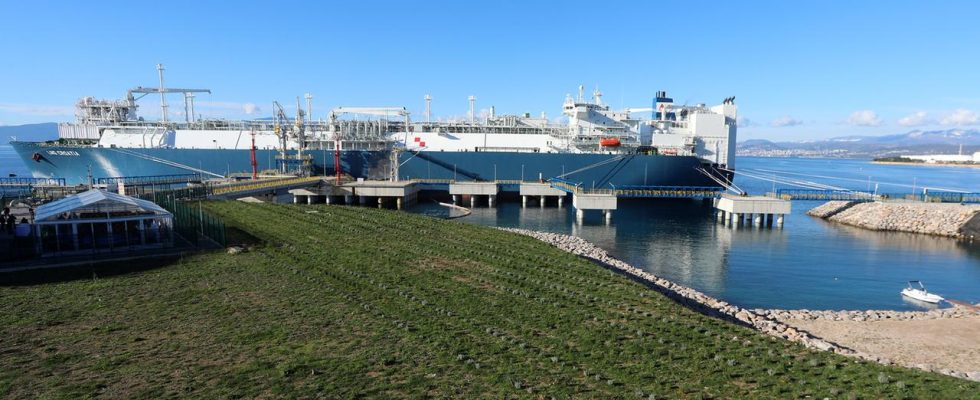In the Balkans, Bosnia and Herzegovina could be supplied with liquid gas from Croatia. But nationalist politicians from both countries are blocking a planned project.
Since 2021, Croatia has received liquid gas via a terminal on the Croatian island of Krk, delivered by gas tankers from the USA. Thanks to the terminal, Croatia became independent of Russian gas and can cover all its gas needs. Now the country on the Adriatic wants to expand the terminal: Krk should become a hub for the transport of fracking gas from the USA. That’s why politicians from Germany and Austria came knocking two years ago. But the terminal for the Balkans seems to have the greatest potential. Bosnia and Herzegovina in particular could benefit.
The USA also welcomes the plans to expand the terminal from almost three billion cubic meters to a capacity of more than six billion cubic meters. Just recently, US Secretary of State Antony Blinken wrote letters to the foreign ministers of Croatia and Bosnia and Herzegovina: He urged a rapid expansion of the terminal and the construction of a line from Croatia to the neighboring country.
However, experts there view the project critically. The “južna interkonekcija” the “southern gas pipeline” would primarily benefit the USA, says Damir Miljević, energy expert and member of the Center for Sustainable Energy Transition RESET. He questions the project in general. America, he said, had “persuaded Europe” to switch to liquid gas and was therefore the only beneficiary.
Bosnian Serbs on the side of Russia
The project also has geopolitical significance. Croatia is a NATO and EU member and is clearly oriented towards the West – Bosnia and Herzegovina, on the other hand, is a divided country: The Bosnian Serbs see themselves as a loyal partner of Russia and would prefer to secede from the state of Bosnia and Herzegovina.
Just a few days ago, the President of the Serbian Republic, Milorad Dodik, said in an interview: “Whatever you think of Putin, he is now President of Russia and one of the most powerful people in the world. Why should I want to avoid hearing from someone like that? to be friends?” The Serbs are therefore not interested in expanding the pipeline, which would not be particularly technically challenging.
On the Croatian side, the gas pipeline already runs to the port city of Split. From there it would be less than 170 kilometers to the Bosnian capital Sarajevo. But Bosnia and Herzegovina receives Russian gas, which also comes to Bosnia via the Serbian part of the country, Republika Srspska. Access to the flow valves lies with Serbian companies and Serbian politicians – and they are definitely using their power.
When the gas supply contract for Sarajevo expired a few years ago, the Serbs threatened to cut off the flow of gas. “People feel the power of the valve,” says Amir Becarevic, an energy expert from Sarajevo, “and when you turn the valve, you think you are big and strong. This valve gives you the opportunity to politically blackmail tomorrow.”
Čović calls for more Operating company
Leading representatives of the Croatian ethnic group in Bosnia and Herzegovina are also accused of blackmail. The most influential Croatian politician, Dragan Čović, is blocking the gas pipeline project. For three years, the Bosnian Croats in the regional parliament have refused to pass the necessary laws.
Čović always referred to the “interests of the Croatian people”. He only wants to give up his blockade if an additional operating company for the transit of gas from Croatia is founded in the Croatian part of the country, in Mostar. Observers suspect corruption and suspect that Čović wants to make money from the project.
From an economic point of view, an additional operating company would be unnecessary: Bosnia and Herzegovina is small, with around 3.2 million people living in the country. At the moment, about 300 million cubic meters of gas are consumed per year across the country. According to Bosnian experts, more than 500 cubic meters of gas would have to be consumed in order to generate enough income for the pipeline operation. And there is still no gas storage facility in Bosnia and Herzegovina.
Croatia’s government doesn’t want to risk anything either
Dragan Čović, however, can rely on the support of the current Croatian government from the conservative HDZ party. For the party, the Bosnian Croats are a safe bet, especially in an election year like this. Many of the more than 500,000 ethnic Croats have a Bosnian as well as a Croatian passport and can vote in the elections in Croatia – and many traditionally vote for the HDZ.
Before the parliamentary elections on April 17th, Prime Minister Andrej Plenković of the HDZ does not want to spoil things with the Croats in Bosnia. At a meeting with Čović, Plenković stated that he supported “Dragan Čović’s position regarding the need to take into account the interests of the Croatian people in Bosnia and Herzegovina.”

